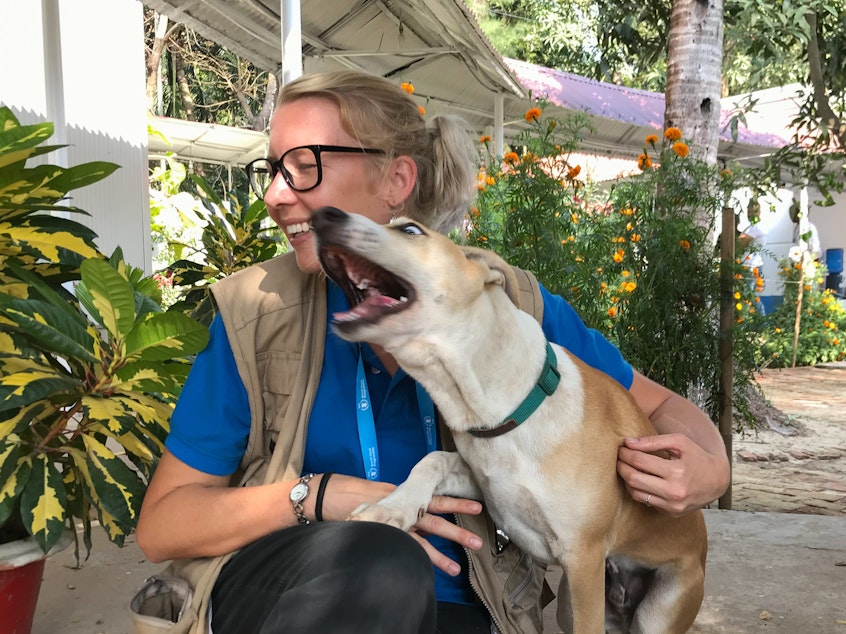Lost Pup Finds New Life As Humanitarian Mascot In Refugee Camp

Cox's Bazar, a town in Bangladesh, has become the headquarters for the massive humanitarian operation to support the nearly 1 million Rohingya refugees who have fled from Myanmar.
But Cox's Bazar is also home to what local tourism officials tout as the "longest sand beach in the world" –with 75 miles of unbroken sandy coastline. Once a month those two worlds come together as international humanitarian workers from the dozens of charity groups in Cox's Bazar volunteer in a beach cleanup.
It was at one of these beach cleanups back in November that a group of staffers from the World Food Programme rescued a 4-week-old puppy, who has since been named Foxtrot.
"This puppy just appeared and started following us," says Gemma Snowdon, who is originally from New Zealand and now works as a communications officer with the WFP. "And we kind of tried to discourage it, you know. Tried to get it to go back to its mum wherever its mum was but it just kept on following and following and following."
Foxtrot was tiny and exhausted. He was severely dehydrated and far more interested in Snowdon than in trying to finding his real mum. Eventually Snowdon brought him to her office in the WFP's compound.
"I left him here overnight and honestly none of us expected him to survive because he was just so small and far too small to be away from his mum," Snowdon says. "But I came in the next day and he was happily running around, and he's been running around the compound ever since."
Sponsored
Under her wing, Foxtrot regained his strength. He now appears in online videos, as a voiceover narration (in the dog's voice!) talks about the important work that WFP is doing to help the Rohingya refugees. "I'm part of the operations in the world's largest refugee camp," Foxtrot earnestly declares in a video while appearing to monitor a computer screen. "I even have my own ID badge! Did you know that more than 870,000 Rohingya refugees are in need of assistance?"
The Rohingya refugees are not officially allowed to work in Bangladesh and rely primarily on the U.N.'s World Food Programme to feed themselves and their families. The WFP provides food aid, including 8,000 metric tons of rice each month, to 869,690 Rohingya refugees in Bangladesh.
Back at the WFP office in Cox's Bazar, not everyone was thrilled about the arrival of Foxtrot.
"I'm not really a dog person at all," says Binta Bajaha, who works on gender issues for WFP's Cox's Bazar operation. Bajaha is originally from Gambia but now lives in Canada. She was also at the beach cleanup when Foxtrot was "rescued" and didn't think the whole thing was a good idea.
"I wasn't sure what they had planned to do with Foxtrot in an office. I was like, 'What are you going to do with a dog in an office?' "
Sponsored
The question may really have been what Foxtrot was planning to do with the humans in an office.
"He likes to say hello and bite a few legs here and there," says Zeff Kapoor, deputy emergency coordinator for WFP in Cox's Bazar, with a laugh. Kapoor describes himself as an Indian Kenyan who grew up in the U.K. He says Foxtrot has become a big presence at the compound.
"We love him. And he's here to stay now with us."
Although soon after he arrived, it wasn't clear how long that might be. Several weeks later he got sick a second time and almost died.
"There are no vets in Cox's Bazar, which means that we weren't able to get him vaccinated," Snowdon explains. "We had a terrible scare because he got parvovirus, and parvovirus has about a 90 percent mortality rate in puppies who aren't treated by a vet."
Sponsored
Actually there is a vet in Cox's Bazar, but he only treats goats, sheep and cattle, and sometimes horses.
So Snowdon rallied her colleagues to try to figure out how to get Foxtrot on IV fluids. "We managed to find a couple of nurses who would come over and put an IV drip in to give him saline solution and electrolytes and amino acids."
She even recruited Binta "I am not a dog person" Bajaha for the effort to save Foxtrot.
"Lo and behold, Gemma [Snowdon] called me to bring the first-aid kit on Friday, which is the weekend here," says Bajaha, who months later still sounds surprised that this task fell to her. "So I got up and went to see how he was doing. And then, you know, you actually become invested in him. Now he's part of the family whether I'm a dog person or not."
On International Women's Day this year, Foxtrot paid Bajaha back for her medical help. He has a World Food Programme cape that he wears when he goes out in the field. It's sort of the canine equivalent of a humanitarian vest. But on International Women's Day he donned a purple Women's Day cape as he toured WFP projects — which Bajahan, with her focus on gender issues, appreciated.
Sponsored
"And he has his Instagram page so he makes sure that people are aware of things that we do here in Cox's Bazar for the Rohingya operation. So love him or not, Foxtrot is an asset, I guess."
Besides his skills as a mascot, Foxtrot is quite good at fetching plastic water bottles, Snowdon adds.
When he's not at work in the largest refugee camp in the world, Foxtrot can be found at Humanitarian_Pup on Instagram, and he occasionally pops up on Twitter. [Copyright 2019 NPR]
